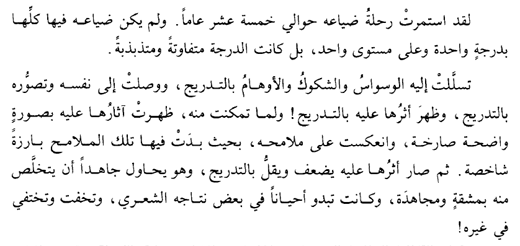| Monday, 17 November 2025 Home • About Us • Contact Us |
 | |
|
|
|
You are here:
Home /
Sayyid Qutb
Mail to a Friend • Printer friendly
Sayyid Qutb and Marxist Communism
Sayyid Qutb, despite an early Islamic upbringing, spent around 15 years or so in uncertainty and confusion, doubting about the very foundations of Islam. In this period he studied and was influenced by the materialist philosophies of the West, and was particularly influenced by Marxist Socialism. He was a member of the secular Hizb ul-Wafd party for a period of time. He maintained a strong relationship with Abbas Mahmud al-Aqqaad, the Egyptian Existentialist, nationalist, writer, philosopher, and was influenced by him until the late 1940s. Refer to the book of Salaah al-Khaalidee (من الميلاد إلى الإستشهاد) "From Birth to Martyrdom" a biography of Qutb (pp. 213-245), in which al-Khalidee recounts this period of great confusion of Sayyid Qutb in his thoughts and ideas before turning to Islam - there are quotes from this book at the end of this article. That Marxist Communist nurturing unfortunately never left him and it continued in the laying down of his "fikr" when he started writing about Islam from the late 1940s onwards. When trying to criticize Capitalism, he had no recourse except to the ideology of Marxist Communism, which comes through his discourses on Islam, Capitalism and "Social Justice" in his books. Sayyid Qutb: Islam is a Mixture of Communism and Christianity Below is the inside page of the 13th edition and print of Sayyid Qutb's "Ma'rakat ul-Islam war-Ra'samaaliyyah", published in 1993CE (1414H).
The books of Sayyid Qutb continue to be published under the supervision of his brother Mohammad Qutb who is upon the same "fikr". Qutb says (p. 61):
The words used by Qutb (تصوغ) - forming, shaping, moulding something from something, to forge, fabricate something. And (مزيجا) - compounded, blended, a mixture, medley, blend, combination, compound, alloy - from (مزج) - to mix, mingle, incorporate, blend, i.e. a thing with water, or a thing with something else. And he added to that (كاملا) - complete, perfect. All this from Lane's Lexicon. So we have a complete, perfect, mix and blend of each of Communism and Christianity into a medley, compound and alloy, to make up Islam. Therefore Qutb has stated that Islam is a mixture and blend, a mingling of those ideologies of men and shares in their ideals and goals, and that it simply adds the elements of harmony, balance and justice to a combination of those man-made religions and secular systems.
With these kinds of statements it should come as no surprise that Sayyid Qutb should incorporate some of these Marxist Communist ideals or doctrines into his "fikr", when he started writing about Islam without knowledge. Marx and Engels on the Nature of Capital and Private Ownership The greatest foundation laid down by Communism is the confiscation of private property and wealth by the state and its redistribution (according to the state's designs) upon the principle that the fruits of all private endeavor actually belong to the whole society. This being in the name of preventing "exploitation and abuse" through "private capital and wealth". Thus capital is presented as being "common property". This perception of capital (wealth) is the foundation upon which communist social policies are built. Marx and Engels wrote, laying down the foundations, in their 1848 paper "The Communist Manifesto" (p. 14):
The Communist Manifesto argues for the abolition of private property and for the right of the state to take and redistribute wealth as it sees fit. Qutb, after acknowledging the right to individual ownership, allows the state the same power afforded in the Marxist Communist ideology, above and beyond that afforded by the Sharaa'i (legislative commands) of Islaam (meaning Zakah). Qutb goes further, and also permits the state to impose taxes that it sees fit to impose - not unlike the progressive income taxes that are also found in "the Communist Manifesto" as part of their solution to combat the so-called "tyranny" of "capital" (i.e. private ownership). Marxist Socialism in Qutb's Book "Social Justice"
It is in this same book (amongst others) that Qutb's scorn, revilement and attacks upon Uthmaan (radiallaahu anhu) and Mu'awiyah (radiallaahu anhum) and the Bani Umayyah are found, and his attacks upon them are from the angle that they departed from the envisaged "Social Justice" Qutb was writing about and in whose formulation, he received a helping hand from the manifestos of secular atheist Jews regarding what denotes Social Justice. And it is through these scales of justice that he finds fault with those Companions, accusing them of departing from the "spirit of Islam". Qutb writes in "Social Justice" (p. 91, Dar ash-Shurooq, 1995CE):
وأول مبدأ يقرره الإسلام بجوار حق الملكية الفردية: (1) أن الفرد أشبه شيء بالوكيل في هذا المال عن الجماعة. (2) وأن حيازته له إنما هي وظيفة أكثر منها امتلاكاً. (3) وأن المال في عمومه إنما هو أصلاً حق الجماعة. (4) والجماعة مستخلفة فيه عن الله الذي لامالك لشيء سواه. (5) والملكية الفردية تنشأ عن بذل الفرد جُهداً خاصاً لحيازة شيء معين من هذه الملكية العامة التي استخلف الله فيها جنس الإنسان
It is true that all wealth belongs to Allaah in reality, and that a person is simply a trustee over his own wealth for the period that Allaah decrees it remains with him, however Qutb has inserted here the Marxist Communist notion that private wealth earned and owned by an individual is fundamentally the property of the society as a whole, and that the real ownership (after Allaah) belongs to that of the society. And it is in this manner we see that Qutb "fuses" and "mixes" secular atheistic ideals, maxims and principles that he was nurtured upon for two decades of his life, with Islam, and it is no surprise that he sees Islam as a concoction and fusion of the goals and objectives of "Communism" and Christianity. Qutb also writes in "Social Justice" (p. 94, Dar ash-Shurooq, 1995CE):
فخلاصة الحقيقة عن طبيعة الملكية الفردية في الإسلام (1) أن الأصل هو أن المال للجماعة في عمومها. (2) وأن الملكية الفردية وظيفة ذات شروط وقيود. (3) وأن بعض المال شائع لا حق لأحد في امتلاكه، ينتفع به الجميع على وجه المشاركة. (4) وأن جزءاً منه كذلك حق يرد إلى الجماعة لترده على فئات معينة فيها، وهي في حاجة إليه لصلاح حالها وحال الجماعة معها
The fourth point mentioned above is essentially "zakah" (obligatory charity), however Qutb has gone beyond that by presenting it within the context of the broad communist socialist doctrine he has outlined in the first three points, and he has presented what is "zakah" within the context of that communist doctrine, which is that private wealth and private ownership (of capital) actually belong to the society and to the state, which may if it wishes, confiscate this wealth for redistribution. These ideas that Qutb is presenting with an Islamic flavor, are nothing but the arguments of the Communists for embezzling the wealth and capital of people, all in the name of Social Justice and equality. An Illustration of Qutb's Ignorance In this same book ("Social Justice in Islam") on pages 91-92, Qutb, after outlining the Marxist Socialist principle of individual ownership (wealth) being the right of the community as a whole, Qutb writes:
And here Qutb is saying, "I do not affirm this principle", meaning that private property and individual ownership is in its foundations, the right of the jamaa'ah (group, society) "in order to affirm the Communism of capital (wealth)" - and that's a contradiction, and its like an Ash'ari saying, "I am not saying that this Qur'an we have with us is created..." which is what the Ash'arites hold, that the Qur'an we have, in letter and word, is created, "...in order to affirm Allaah's kalaam is created...". Meaning that the Ash'ari denies he holds Allaah's "kalaam" (speech) to be created, and then in the next sentence he affirms the fundamental doctrine of those (Jahmiyyah, Mu'tazilah) who hold Allaah's "kalaam" is something He creates, through their belief that the Qur'an is created. And this is what Qutb is doing here, and this is the way of the "thinkers" who tried to write about Islam without knowledge and understanding, and fell into such confusion and contradiction. The core principles of Marxist Communist Socialism, is that the true nature of property and capital (held by private individuals) is, in its foundation, the right of the society, and the state has the power and ability to confiscate that wealth if it wishes, and the power to legislate laws for the confiscation of that wealth (which would include taxes) for whatever purposes the state sees fit (to actualize "Social Justice"), and for it to confiscate idle wealth that people are sitting on, for redistribution and that in a nutshell is "the Communist Manifesto" of Marx and Engels. This is the blend and mix that Qutb speaks of in the quote from him at the beginning of this article, the blend and mix between Communism's objectives and Islam, into which Islam brings "harmony". Qutb continues:
Meaning, (in Communist speak) that when a person is brainwashed with these Marxist Communist principles, that the state ("representing the society") has a right over his wealth for the "social justice of all", he will readily accept what amounts to the "theft" of his private property, and consider that as part of Social Justice. And thus, the state can make taqneen (legislate qawaaneen) for the theft of that property. Qutb continues:
You have to really understand the significance of what Qutb is saying here. After re-affirming for the second time and with emphasis, the Marxist Communist Secular maxim and principle that privately held wealth actually belongs to the society as a whole, and that this is a deep-rooted foundation, he then says that the society (represented in the "state") has the power and right to legislate new laws to impose obligations (such as taxes, see below) and restrictions, through which "Social Justice" can be established. This is a revilement upon Islam, as if the pillar of zakah and sadaqah and the very clearly laid out monetary obligations laid out in the Sharee'ah are in need of additional Qawaaneen (laws, statutes) to help "actualize social justice". But this is what Qutb is actually saying, and you wonder in amazement at the Qutbiyyah who defend this individual who was nothing but a sentimental and ignorant writer in whose mind all the materialist western philosophies distilled for twenty years, after which he became interested in Islam and started writing, without knowledge or baseerah, and he brought great, great calamities, including the greatest of innovations, those of the Jahmiyyah, Mu'tazilah, Ash'ariyyah,Jabariyyah and others, and claimed Islam was a mixture and concoction of Communism and Christianity and simply added "harmony" to the mix. In short, Qutb permits the legislation of Secular Laws, above, over and beyond what is in the Sharee'ah in order to help actualize "Social Justice" - so long as those laws don't "exceed the principles of Islamic law" - and these laws he is talking about are those following on from the Communist maxim of "wealth is the common property of all members of the society". Meaning, we can legislate secular laws to help fulfill the objectives of Communism that are nothing but attempts to confiscate (steal) the wealth owned by private individuals - all disguised as and given the title of "Social Justice". Sayyid Qutb and Confiscation of Private Property and Wealth by the State The books Qutb wrote, "The Battle of Islam and Capitalism" and "Social Justice in Islam" were written from a Communist perspective against "Capitalism", and Qutb, having little knowledge of the religion, tried to frame that Marxist Communist critique of Capitalism, upon Islam and present Islam as having Communist ideals and objectives. In the book "The Battle of Islam and Capitalism" (pictured above), 13th edition, 1993CE (p. 44), Qutb writes:
بل في يد الدولة أن تنزع الملكيات والثروات جميعاً، وتعيد توزيعها على أساس جديد، ولو كانت هذه الملكيات قد قامت على الأسس التي يعترف بها الإسلام، ونمت بالوسائل التي يبررها؛ لأن دفع الضر عن المجتمع كله أو اتقاء الأضرار المتوقعة لهذا المجتمع أولى بالرعاية من حقوق الأفراد
The Scholars of Islam only allow the requesting of the excess wealth of the rich where that is necessary for jihad in the path of Allaah, should wealth not be available in the Bayt ul-Mal. Other than this, the only duty upon the people is the giving of zakah on wealth they have possessed for one lunar year, if it reaches a certain amount. However, Qutb has gone way beyond the Sharee'ah and has espoused the quintessence of the Marxist Communist justification for confiscating the wealth of the people, and actually allows the state to legislate laws to facilitate that. Qutb and the Usurping and Theft of the Wealth of Those Who Do Nothing With It Qutb wrote in "The Battle of Islam and Capitalism" (p. 52)
والإسلام عدو التبطل الناشئ عن تكدس الثراء، فلا جزاء إلا على الجهد ولا أجر إلا على العمل ، فأما القاعدون الذين لا يعملون ، فثراؤهم حرام وأموالهم حرام، وعلى الدولة أن تنتفع بذلك الثراء لحساب المجتمع ، ولا تدعه لذلك المتبطل الكسلان
Qutb has made "tahreem" of the wealth of those who do not do anything with that wealth. And this is making haraam what Allaah did not make haraam and it is legislating into the deen of Allaah, that which is not from it, for the only thing upon the rich is to give the zakaah, and to fulfil the monetary obligations as regards to their families and dependants. But this is the influence of that Marxist Socialist nurturing of Qutb, and this Tabdeel of the Sharee'ah and this tahreem (on behalf of Qutb) is printed, distributed and read the world over, due to a people propagandizing for Qutb and his fikr and his books. Qutb Permits the Legislation of Specific and Numerous Taxes Upon the People Marx and Engels proposed an income tax as means of preventing and limiting the accumulation of "capital" in the hands of individuals. They write on page 21 of the "the Communist Manifesto", as part of the numerous measures they see appropriate in all countries, to help establish "Social Justice":
This income tax is to be used for the redistribution of wealth in a manner that the state sees fit. Qutb permits the legislation and imposition of a variety of specific taxes, in fact he actually calls the zakah a "tax". Qutb says in "The Battle of Islam and Capitalism" (p. 43):
في يد الدولة أن تفرض أولا ضرائب خاصة غير الضرائب العامة - كما تشاء -، فتخصص ضريبة للجيش ، وضريبة للتعليم ، وضريبة للمستشفيات ، وضريبة للضمان الاجتماعي . . . ، وضريبة لكل وجه طارىء من أوجه الإنفاق لم يحسب حسابه في المصروفات العامة أو تعجز الميزانية العادية عن الإنفاق عليه عند الاقتضاء
As we saw earlier, Qutb considers Islam a fusion of Communism and Christianity and as something that adds harmony to the goals and objectives found in them. Here Qutb is permitting the legislating of Secular Laws to help fulfil those Marxist Communist "goals and objectives" and this must be part of the "harmony, balance and justice" (according to Qutb) that Islam brings into the mix. The imposition of mukoos (sales taxes, levies) are haraam in Islam and are considered dhulm (oppression) and it is a major sin. Imaam adh-Dhahabi includes this in his book "al-Kabaa'ir" (The Major Sins), and Ibn al-Qayyim mentions in "Ahkaam Ahl idh-Dhimmah" (1/149-150), in the course of refuting those who try to analogize for these mukoos (taxes) with an action of Umar bin al-Khattaab in relation to the Ahl ud-Dhimmah:
بعد أن نذكر مقدمة في المكوس وتحريمها والتغليظ في أمرها وتحريم الجنة على صاحبها، وأمر رسول الله صلى الله عليه وسلم بقتله
What Qutb is advocating is worse than the mukoos (sales taxes) that are mentioned by the Scholars, and Qutb is legislating these into the religion and making the legislation of these Qawaaneen from the right of the "Muslim" state. We have already seen that he permits the confiscation (stealing) of the wealth of private individuals and through which the state can establish "Social Justice" - as if the Sharee'ah in its own right and merit, does not establish Social Justice. Qutb Advocates the Marxist-Leninist Revolution to "Snatch and Restore" the Haakimiyyah of Allaah So That this New "Islamic State" Can Establish "Social Justice" Qutb saw the absence of Social Justice, (and the abuse of capital) as factors that justify revolution, and as we will see further below, Qutb praised the revolution against Uthmaan bin Affaan (radiallaahu anhu) for these very same, specific reasons, claiming it was in accordance with the "Islamic spirit" and that those souls that were stirred in this revolution showed rejection and eschewed evil in what they did and that they were motivated by the "Islamic spirit". It is also for this reason that Qutb poured scorn upon Uthmaan, Mu'awiyah (radiallaahu anhum) and the Bani Umayyah. Further, having outlined Marxist Socialism in his works and explained that Islam is a mix and blend of Communism, Christianity and their objectives, Qutb also outlined the Marxist-Leninist revolutionary manifesto. This is not a hidden matter and it is acknowledged by all people possessing sound intellect and the rudimentary elements of academic honesty. Yusuf al-Qaradawi, said in his book (أولويات الحركة الإسلامية) "Priorities of the Islamic Movement" (p.110):
في هذه المرحلة ظهرت كتب الشهيد سيد قطب، التي تمثل المرحلة الأخيرة من تفكيره، والتي تنضح بتكفير المجتمع، وتأجيل الدعوة إلى النظام الإسلامي بفكرة تجديد الفقه وتطويره، وإحياء الاجتهاد، وتدعو إلى العزلة الشعورية عن المجتمع، وقطع العلاقة مع الآخرين، وإعلان الجهاد الهجومي على الناس كافة، والإزراء بدعاة التسامح والمرونة، ورميهم بالسذاجة والهزيمة النفسية أمام الحضارة الغربية، ويتجلى ذلك أوضح ما يكون في تفسير "في ظلال القرآن" في طبعته الثانية، وفي "معالم في الطريق"، ومعظمه مقتبس من الظلال، وفي "الإسلام ومشكلات الحضارة"، وغيرها
In the compilation, "Islam and the West, Critical Perspectives on Modernity" (compiled by Michael Thompson), Omer Caha writes (pp. 44-45), and leaving aside some of the unsubstantiated "Nazi" claims, this is an amazingly insightful analysis and an extremely accurate record of what was taking place with these 20th century Islamic "thinkers":
Thought the writer is writing from the perspective of explaining the lack of democracy, or opposition to democracy in the Muslim lands, his analysis of the origins of ideologies based upon the notions of "state" and "revolution" and borrowed from Russian Bolshevism are extremely accurate. This can be seen in the likes of Abu A'la Mawdudi and very clearly in the writings of Sayyid Qutb. Phil Paine, a writer and independent scholar as he describes himself observes, after reading Milestones for the first time:
It is very interesting to see how individuals that are learned, well-read and well-versed can immediately recognize - after reading just a single book (Milestones) - the true and real origins of Qutb's ideology. The writer also had the knowledge and understanding to recognize Qutb's Asharite leanings. So much for those ignoramus journalists and half-boiled writers linking Qutb to Salafiyyah. As for "Marxist" sources, then Qutb was formerly a communist and some of his communist ideology comes through still in his writings such as advocating the confiscation and redistribution of wealth (that will be dealt with in a separate article). As for "Nazi" sources, then we do not know of any credible evidence at this point in time to suggest he had "Nazi" sources for his ideologies. Ladan and Roya Boroumand wrote in an article titled "Terror, Islam and Democracy", Journal of Democracy 13.2 (2002) 5-20:
Contemporary members of the Muslim Brotherhood acknowledge that Qutb was influenced by Leninist revolutionary methodology. Ibrahim al-Houdaiby writes in an article "Four Decades After Sayyid Qutb's Execution" (bold emphasis is ours):
Paul Berman writes in an article published in the New York Times, 23rd March 2003:
In "Sayyid Qutb: The Father of Al-Qaida", published in the Independent in August 2006, Daniel Martin quotes from Lawrence Wright observing about the book "Milestones":
Rod Dreher writes in the Dallas Morning News (27th August 2006):
As we have noted in a previous article that: The esteemed scholar, Rabee' bin Haadee al-Madkhalee, who has authored numerous works in refutation of the heresies and Extremism of the father of all modern takfiri groups, pointed out in 1995 Qutb's exposition of elements of Communist ideology as well as his Leninist revolutionary activities. Shaikh Rabee' stated in "al-Awaasim Mimmaa Fee Kutub Sayyid Qutb Min al-Qawaasim" (p.38, 1st print, 1995):
And in the footnote, the Shaikh adds to this:
Sayyid Qutb based his ideologies on his own Socialist, Marxist, Leninist background. He had already been involved in one Leninist-style revolution when he along with Nasser and the Free Officers plotted the revolution by which Nasser came into power - though he and Nasser later fell out. The fact that Sayyid Qutb was heavily influenced by Marxist Socialism and Leninism is being firmly established as more and more academic studies are conducted looking at the evolution of Qutb's writings and ideologies in the background of the changing social, economical and political landscapes in the time that Qutb lived (early to mid 20th century). As all contemporary takfiri and jihadi groups who promote revolution as a means of reform have inevitably taken their methodologies from Sayyid Qutb, they can rightly be called Leninist-Kharijites, as the true intellectual basis of their ideologies and methodologies has been thoroughly exposed. Leninism. Qutb could not find the revolution he envisaged in the Qur'an, or the Sunnah or from any of the Orthodox Muslim scholars. In fact the above author has shrewdly pointed this out:
So he took it from Lenin, and then tried to quote from historical and prominent scholars such as Ibn Taymiyyah to argue for aspects of his methodology. As we will show in future articles, Qutb's use of Ibn Taymiyyah to argue for his Leninist methodology is false. Qutb Attacked Uthmaan, Mu'awiyah (radiallaahu anhum) and Bani Umayyah From the Angle of the [Marxist Communist Ideals] of Social Justice and He Praised the Revolution Against Uthmaan (radiallaah anhu) We have covered this in another article in more detail (see here), and we can reproduce some of that here: In the book "al-Adaalah al-Ijtimaa'iyyah" (1415H, Dar ash-Shurooq) Qutb writes (p. 160-161):
Here, Qutb describes the revolution that Ibn Saba' al-Yahudi instigated, ideologically and practically, against Uthmaan, as something that was a manifestation of the real and true spirit of Islaam - which is that spirit fused with Marxist Communist notions of "Social Justice" with a (مزيجا كاملا), and the spectacles of which Qutb is looking through towards the Companions when he speaks about them - and Qutb described it as such whilst making full admission that it was a revolution instigated by Ibn Saba'. So while he avers the fact that it was plotted by Ibn Saba' he actually agrees with it and is content with it, and considers it in line with the "Communist Islamic" spirit (of "Social Justice") - whilst bearing in mind that Qutb considers Islam to be blended in part from Communism, with a complete and perfect blend, and simply adds harmony to the objectives of Communism! And he also says a little later (p. 161)
You can see here Qutb's choice of words which contain nothing but a continued belittlement of Uthman, Mu'awiyah, Bani Umayyah and glorification of those souls who were stirred by what they saw and were led to revolt, with his full knowledge that it was instigated by Abdullah bin Saba al-Yahudi. And note his statement "whether in truth or falsehood" and this is a statement that a person whose soul is pure towards the Companions would never make. Qutb took these stances because of the influence of his Communist Socialist Marxist background, and because of that notion of [Communist] "Social Justice" which led him to transgress against the Companions and you will then understand why Mahmood Shakir, when refuting Qutb described Qutb's attacks as "the resentments of the idolatrous western civilization manifesting explosively in the heart of one proclaiming defence of Islam and Jihad in its path" (see here).
Mahmood Shakir refuted Sayyid Qutb in 1952 (see here) for this crime of accusing, out of conviction - not a slip of the tongue - the Companions with such things. Qutb refused to back down in his stance, as we will document in other articles, through Qutb's rebuttal of Mahmood Shakir in the same year. And these statements (or revilment) and many others remained in his book until it reached six editions prior to his death, and it continued to be published by his brother, Mohammad Qutb, decades on. Despite some minor changes in wording, Qutb maintained the essence of his position and retained his attacks upon Uthman, Mu'awiyah, Amr bin al-Aas (radiallaahu anhum), Bani Umayyah and others, in his books. As for the catalog of revilements of Qutb against Uthmaan (radiallaahu anhu), they will be documented separately inshaa'Allaah, how numerous they are and how repugnant they are. What's the Deal in a Nutshell?
In this entire section spanning forty or so pages Khaalidee discusses the period of doubt and confusion that Qutb went through for 15 years of his life until the 1940s, and in which he (anda his mentor of the time Abbaas al-Aqqaad, poet, writer, philosopher, existentialist) simply "gulped down" (Khaalidee's expression) the materialist philosophies of the 18th, 19th and 20th centuries. We can bring a few quotes here from al-Khaalidee. He says (p. 23)
And then a page later (p. 214)
And he then says, after mentioning Qutb turning towards the Qur'an and it's study, (p. 215):
From the above quotes we see:
Then in 1952 he was instrumental in the July revolution, a Socialist, Marxist, Leninist type revolution through which Jamal Abdul-Nasser came to power, and when he fell out with this former comrade and was put into prison in 1954. He then started penning down the Communist Revolutionary Manifesto embodied in Leninism in his books "Milestones" and "az-Zilal", which became the spring and fountain for the madhhab of the Khawaarij. And he did not outline his revolutionary doctrines because he was imprisoned, being forced due to the circumstances, out of anger and resentment, as some people claim. Rather he was already ideologically upon that, and he'd plotted one successful socialist revolution already.
So the Communist Revolutionary Manifesto and what it contained of the notions of "Social Justice" [think Dhul-Khuwaisarah and the "unfair distribution" of "capital" that was not "just"] and "revolution" [think the revolution of Abdullah bin Saba' against the third Khalifah Uthman (radiallaahu anhu)] - these notions became the backbone for the aqidah of the 20th Century Khawaarij who were nurtured upon the works of Sayyid Qutb, all of whom strangely and ironically enough, came out in the name of "al-Haakimiyyah" itself.
Thank's Marx, Engels and Lenin! You brought the Qutbiyyah their "Social Justice", "State" and "Revolution" - just like those Jews and Christians brought al-Ma'bad al-Juhanee, al-Ja'd bin Dirham and al-Jahm bin Safwan their doctrines of the negation of al-Qadar, the Qur'an being created, and the negation of Allaah's Attributes. And just as those innovators put the Ummah to trial with a mighty tribulation (the fitnah of the creation of the Qur'an), then indeed the 20th century Jahmite Ash'ari, Sufi Mufawwidhs of Egypt put the Ummah to trial with a mighty tribulation with their "fikr" that unleashed untold splits, divisions, vile hizbiyyah like never seen before with fanatical bigotry through the jamaa'aat (groups) and jam'iyyaat (societies) they spawned, let alone the destructive Extremism in Takfir, Takfir of the whole Ummah, of its rulers, scholars and general-folk, in addition to the ideological justification of terrorism in both Muslim and non-Muslim lands against innocent men, women and children. And then you don't know what to make of these ignorant deluded, intellectually bankrupt people who make their way on to blogs and forums claiming to lift the banner of "Haakimiyyah", propagandizing for Sayyid Qutb, whilst his books are printed, widespread and distributed with this evil perception towards the Islamic Sharee'ah and that evil viewpoint towards the choicest of Companions - except that you think of:
Link to this article: Show: HTML Link • Full Link • Short Link Related Articles:
You must be registered and logged in to comment. |


|
|||||||||||||||||||||||||||||||||||||||||||||||||
|
|
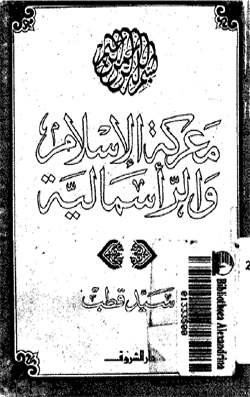
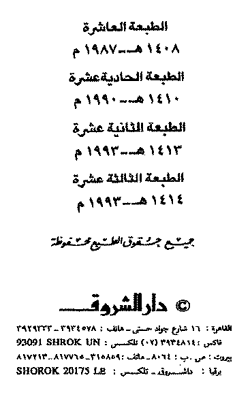

 And it is necessary for Islaam to judge, since it is a unique, constructive and positivist
And it is necessary for Islaam to judge, since it is a unique, constructive and positivist 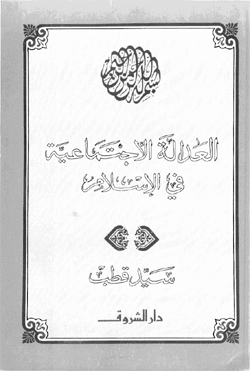 In the book "
In the book "

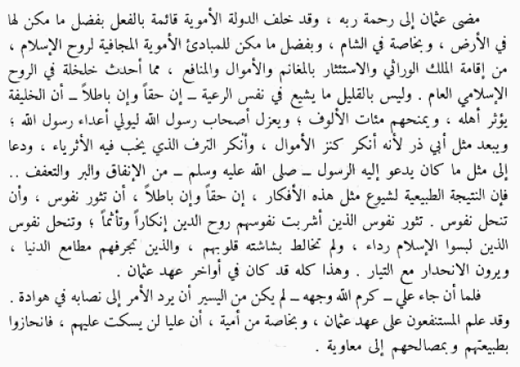
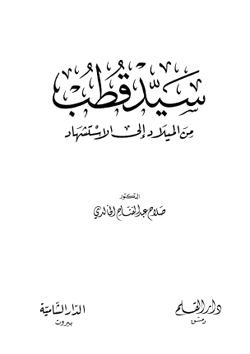 The realities can be arrived at by looking at what Salaah al-Khaalidee has written in his book (
The realities can be arrived at by looking at what Salaah al-Khaalidee has written in his book (

